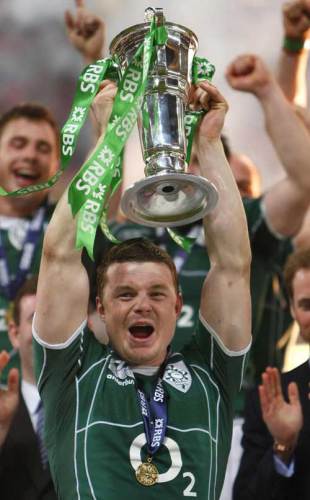|
Wales 15-17 Ireland, Six Nations Championship, March 21
Ireland deserve moment of glory
Huw Richards at the Millennium Stadium
March 21, 2009

Ireland skipper Brian O'Driscoll lifts the Six Nations trophy following his side's narrow victory over Wales at the Millennium Stadium
© Getty Images
Enlarge
You don't ever really, truly want your own team to lose (and you don't as a sports journalist ever entirely lose that sense of who your team is - you are after all doing the job because you are a fan - but just do your best to ensure that it doesn't affect your judgment). Some defeats, though, are a lot less painful than other. It would have taken a very partisan Welshman to begrudge Fiji their victory at Nantes in 2007. They deserved it, and winning meant so much more to them than another defeat did to Wales. Ditto, and for much the same reasons, Italy in Rome in 2003. Ireland in Cardiff in 2009 joins that list. Had Stephen Jones landed that last-minute penalty, it would have been a grotesque injustice. Ireland were the better, the more imaginative and creative team. The difference between second and fourth place will certainly be noticed by the treasurer of the Welsh Rugby Union, but it was vastly less than the difference between Grand Slam, Triple Crown and Championship and title only for the Irish. Ireland deserve everything they have achieved. They were the better side in every match they played. Like Wales last year they defended superbly - concedingly only England's well-fashioned but academic last-minute try in Dublin during their last 350 minutes of championship action - and took their own chances. For Shane Williams, Ryan Jones and Warren Gatland last year, read Brian O'Driscoll, Paul O'Connell and Declan Kidney in 2009. More than that, this is a prize they have earned over a decade. It was never likely that the stupid, arrogant talk one heard about England v France being the only match that mattered, and the Celts not worth playing, would actually have led to the demise of the Six Nations championship. It is simply too profitable for unions desperate for funds to have contemplating destroying. It was Ireland, though, who made a nonsense of it when Wales and Scotland could not. Over the first 10 Six Nations seasons they have won as many matches, 36, as France and three more than England. That this had no reward, other than Triple Crowns, before now when Wales's 23 wins included two Grand Slams is one of the great sporting oddities. Victory here recalled a parallel occasion in Cardiff three years ago, Munster's long-awaited Heineken Cup triumph. Their fans can, like Scots in 1984, Englishmen in 1980, Welshmen four years ago and Frenchmen in 1968, cherish a triumph long-postponed. But where it differs from all of those, except perhaps the first French Slam, is that it was a triumph that had often seemed to be in reach, only to be snatched away.
We can imagine the comments about 'choking' that would have prevailed had they fallen short this time. Cruel, facile and also unfair. Choking is when you lose to a patently less accomplished team - as England did in 1999 and 2000. It is not being beaten by one of the two or three best teams in British and Irish history - as Ireland were by England in 2003 - or falling by a narrow margin on the ground of your closest rival, as Ireland nearly did today. But they didn't fail. To be disappointed and come back again, to have the nerve needed to run though the phases until you are ready to land the decisive drop with the seconds ticking away, takes intestinal fortitude. Players like O'Driscoll and O'Connell, Ronan O'Gara and the grossly underrated Peter Stringer, John Hayes and David Wallace have been through that full gamut of emotion and emerged unbowed. It puts a final seal on what can now be seen as the finest decade in Irish rugby history. Even if you exclude the 10 victories over Italy, 26 wins out of 40 is still a very fine record. Four Triple Crowns is comfortably more than they have ever achieved - their main problem throughout being the inability to beat France that has afflicted Irish teams, the best almost as much as the worst, for the past half-century. Once that jinx had been seen off on the opening weekend, the Cardiff denouement was a serious possibility. Perhaps it wasn't a great Six Nations, but that doesn't really matter. There is no quality control attached to Grand Slams. What they say is that a team has found the nerve, the consistency and the talent necessary to beat five bitter rivals in a short space of time. It has been a long time coming, and Ireland deserve every minute of their euphoria. © Scrum.com
| |||||||||||||||
Live Sports
Communication error please reload the page.
-
Football
-
Cricket
-
Rugby
-
- Days
- Hrs
- Mins
- Secs
F1 - Abu Dhabi GP
Abu Dhabi Grand Prix December 11-131. Max Verstappen ()
2. Valtteri Bottas (Mercedes)
3. Lewis Hamilton (Mercedes)
4. Alexander Albon ()
5. Lando Norris ()
6. Carlos Sainz Jr ()
-
ESPNOtherLive >>
Darts - Premier League
Golf - Houston Open
Snooker - China Open
Tennis - Miami Open

